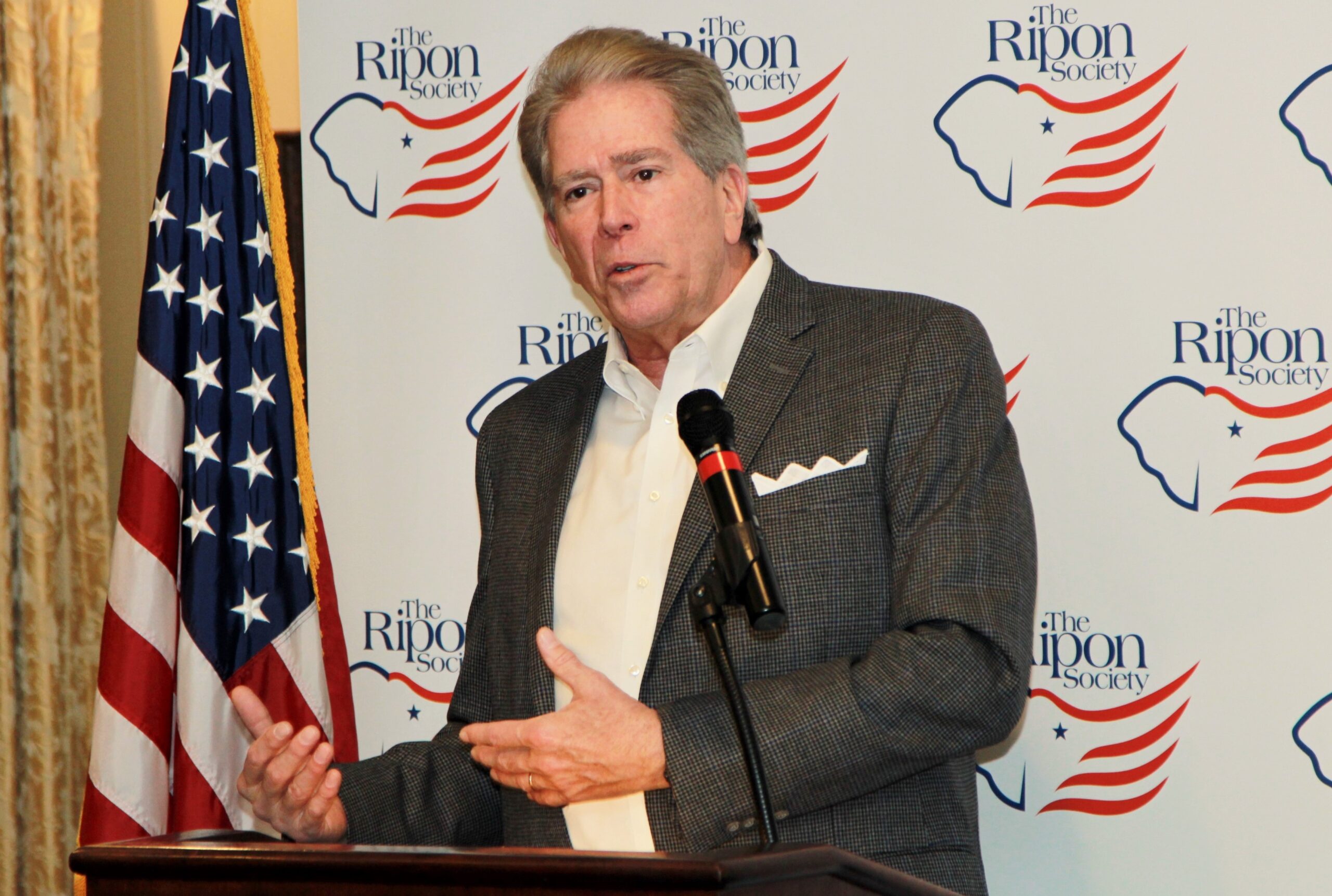 Veteran Strategist Ed Goeas Discusses Results from Ripon’s Annual Survey of the American Voter
Veteran Strategist Ed Goeas Discusses Results from Ripon’s Annual Survey of the American Voter
WASHINGTON, DC – Last month, The Ripon Society released its 4th annual Survey of the American Voter. Conducting the survey on behalf of The Ripon Society was The Tarrance Group, led by its president and CEO Ed Goeas, who appeared on February 11th in front of a luncheon discussion to talk about the results of the poll and how to interpret the findings.
The survey touched on many contentious issues of the day with the purpose of gauging public opinion on the state of the country and providing a better understanding of what voters are thinking going into 2019.
“We lost 40 seats, and it basically was because [Democrats] had enough suburban districts that if they ran the table they were going to win that many seats,” Goeas explained as he discussed the 2018 mid-term election. “But we did not lose. We had a great night in terms of the Senate and part of the reason why is it wasn’t suburban districts. It was Trump country, where Republican voters came out.”
With the loss of the House of Representatives in the election, many pundits speculated it was due to independents overwhelmingly turning out to cast their votes for Democratic candidates—Mr. Goeas disagrees.
“I always kind of tapped down all the talk about independents, because a lot of that drop off from 60% to 40% in a presidential year turnout to non-presidential year turnout is independent voters and soft Democrats and soft Republicans – primarily independents. And they come roaring back in the next election. So, paying attention to them this year and next year is much more important than paying attention to them in 2017, 2018.”
Turning his attention toward 2020, Goeas discussed what the president must do to build a coalition in order to better his chances of reelection. They consist of: his base; voters who may not like him personally but prioritize his policies; and voters that support his policies but prioritize their dislike of the president’s persona. How does he build his support? Focus on policy.
“If you get a sole focus on policy, when you ask what’s his job approval on taxes, or jobs, or the economy, that’s when he starts getting approval numbers over 50%, because you’re mentally asking that person to forget about the persona and just thinking about the issue. How is he doing on the issue?
“That’s the group of voters, when you combine all three, that gets them to a majority. Those are the voters that every time he tweets something, I’m just beating my head against the wall thinking, ‘Don’t you guys see that if we just talked policy, you’d be knocking this out of the park?’”
Goeas continued explaining, “The concern on this survey is we saw, and what we saw in the public polling also, is that Trump’s job approval – which had been hovering in the 40’s –dropped below 40% for the first time. It was driven by the focus on his personality rather than a focus on issues. One of the things you’ll see when we get to the issues, if he would stop saying ‘the wall’ and explain a little bit more, specifically what he wants to do, it’s amazing how the support level goes up for it.”
At the same time, Goeas emphasized that the president is doing the right thing by tending to his political base so frequently. Without his core supporters, his approval rating begins to erode substantially.
“He really has a sense of that base and that he has to say certain things. I think he’s right from this standpoint. He has to keep that base stirred up because if he loses the intensity with them, which he appeared to be doing around Christmas time right after the election, there were several polls that the ‘strongly approve’ on his job approval dropped from the 30’s down into the low 20’s.”
The national survey also dove into the variety of issues that have gained prominence in the political landscape. According to Goeas, “There are two issues that jump up in looking at first and second choice. 42% mentioned immigration and 40% mentioned healthcare.”
Concerning healthcare, one thing that stuck out to Goeas was how one particular demographic viewed the current system under the Affordable Care Act.
“What was interesting is 67% of low income voters said healthcare had gotten worse. The very voters this was supposed to help are the highest response of ‘not enough has been done.’”
And as for a Medicare-for-All system, even though 46% of Americans would favor this approach to healthcare, “53% of seniors said no.”
“We won the Tennessee Senate race in the last election because the Democrat just jumped off the cliff at the beginning of the campaign about making Medicare-for-All. Seniors are hearing enough bad things about the social security system and Medicare being properly funded and administered. The last thing they want is a bunch of these young millennials standing in line with them for their healthcare.”
Goeas touched on the results concerning immigration, the most important issue voters want to see addressed in 2019.
“Building the wall along the southern border of Mexico: 55% say no, but 88% of Republicans say yes. 92% of Democrats say no. And again, remember how important I said independents were? 68% say no. Presented this way, this is not a good issue for us in the presidential campaign, but it’s good for the Trump base.”
As for giving permanent legal status to illegal immigrants brought here as children, 63% of voters approve. And when it comes to increasing security measures through means such as using drones and increasing the number of border patrol agents, 82% of voters support it.
According to Goeas, the findings of this survey make one thing clear: good, clear messaging on these polarized issues is crucial in order for the president to build support for his initiatives.
“You have to get [voters] to buy in on the concept of what’s there. You have to give them a little bit more information than just, ‘build the wall.’”
To view the slides from Goeas’ presentation to The Ripon Society, please click here.
To view his remarks, please click on the link below:
The Ripon Society is a public policy organization that was founded in 1962 and takes its name from the town where the Republican Party was born in 1854 – Ripon, Wisconsin. One of the main goals of The Ripon Society is to promote the ideas and principles that have made America great and contributed to the GOP’s success. These ideas include keeping our nation secure, keeping taxes low and having a federal government that is smaller, smarter and more accountable to the people.



